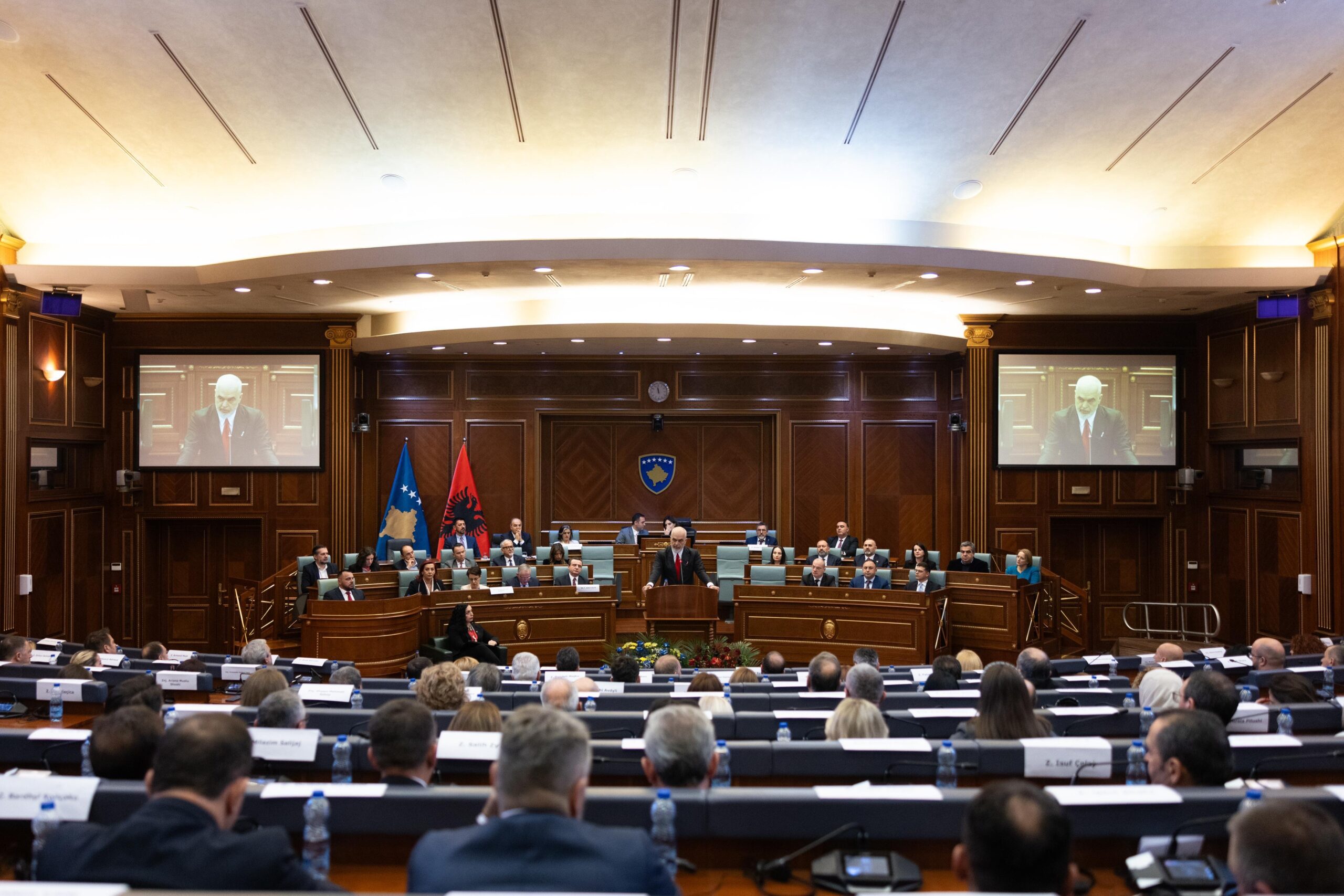Albanian and Kosovo Parliaments convene in Pristina for joint session

130 Members of Parliament from Albania and Kosovo, alongside their respective government cabinets, gathered in Pristina for a joint session that marked a milestone in fostering unity and cooperation between the two nations. Albanian Prime Minister Edi Rama, Kosovan Prime Minister Albin Kurti, and Kosovo’s President Vjosa Osmani participated in the session, highlighting its importance for regional dialogue and collaboration.
Why is this important: The session was particularly significant given the strained relations between Rama and Kurti over the past two years. Their discord began after Rama postponed a planned joint government meeting in Kosovo. Today’s gathering not only united the two leaders in the Pristina Parliament but also included a private meeting in Kurti’s office, where they signed an agreement to host the Mediterranean Games Prishtina 2030. In his address, Rama delivered pointed messages directed at Kosovo, the European Union, and the ongoing sanctions imposed on Kosovo.
Context: In his speech Prime Minister Rama called the EU sanctions against Kosovo “absurd” and revealed that both he and President Osmani had lobbied for their removal during the recent EU-Western Balkans Summit. However, Rama subtly criticized Kurti’s stance toward international allies, suggesting that it negatively impacts Kosovo’s integration into global organizations.
“The discontent of our strategic allies with Kosovo hinders us from doing as much as we would like for Kosovo,” Rama said.
He also emphasized the necessity of strengthening ties with the EU and the United States, Kosovo’s key allies, to further the region’s integration into Europe. He also cautioned Kurti against pursuing nationalist reciprocity with Serbia, suggesting it hinders progress toward normalization and integration.
Rama’s proposal for Kosovo: “In this critical phase, Kosovo should indefinitely ‘freeze’ bilateral dialogue with Serbia and instead pursue normalization through the EU. Kosovo must sever nationalist reciprocity with Serbia and embrace European reciprocity with the EU. Meeting the conditions for normalization unilaterally is not for Serbia’s sake but for Kosovo’s martyrs, children, and our collective path toward European unity,” Rama proposed.
Kurti’s response: Prime Minister Kurti avoided directly addressing Rama’s proposals or criticisms. Instead, he called on Albania to lobby for Kosovo’s NATO membership, citing heightened security threats from Serbia and its ally, Russia.
“The terrorist attacks on Kosovo—whether in Banjskë or on the Ibër-Lepenc water canal—originate from Serbia and are supported by Russia. NATO membership has become an urgent necessity,” Kurti asserted.
Criticism from Haradinaj: Former Kosovan Prime Minister Ramush Haradinaj, now an opposition leader, criticized Kurti’s policies and his handling of relationships with international allies. Haradinaj accused Kurti of aligning with agendas detrimental to Kosovo’s interests.
“The Prime Minister even went as far as calling Secretary Blinken naive. This explains why we are where we are. Every action Kurti takes seems aligned with the agendas of Russia and Serbia,” Haradinaj remarked.
Albanian opposition reacts to Rama: Albanian opposition members criticized Rama for publicly voicing concerns about Kosovo, arguing that such criticisms should be handled privately to preserve solidarity between the two nations. The Albanian opposition is aligned to Kurti and his Vetëvendosje against Rama.
Rama’s call for justice for Thaçi: Rama also addressed the ongoing trial of former Kosovan President Hashim Thaçi at The Hague, describing it as irregular. He proposed that Kosovo’s Parliament adopt a resolution urging the sponsors of the Special Court to establish a Verification Commission to review the trial’s standards.
“The court is independent, but its standards should not depend on individual judges. If these concerns are valid, they represent a grave issue—not just for those on trial but for the integrity of international justice itself,” Rama said, offering Albanian parliamentary support for such an initiative.
Historical context: The session marked the second joint meeting between the two parliaments. The first was held on November 27, 2022, to commemorate Albania’s 110th Independence Day. Joint government meetings between the two nations have been held annually from 2014 until 2022.
Moving forward: Today’s session, which combined agreements and frank discussions, underscores the complexities of Albanian-Kosovan relations while reaffirming their shared commitment to regional stability and integration into European structures. The agreements signed, and the dialogues initiated, reflect renewed efforts to address challenges and foster unity amidst growing geopolitical tensions.


